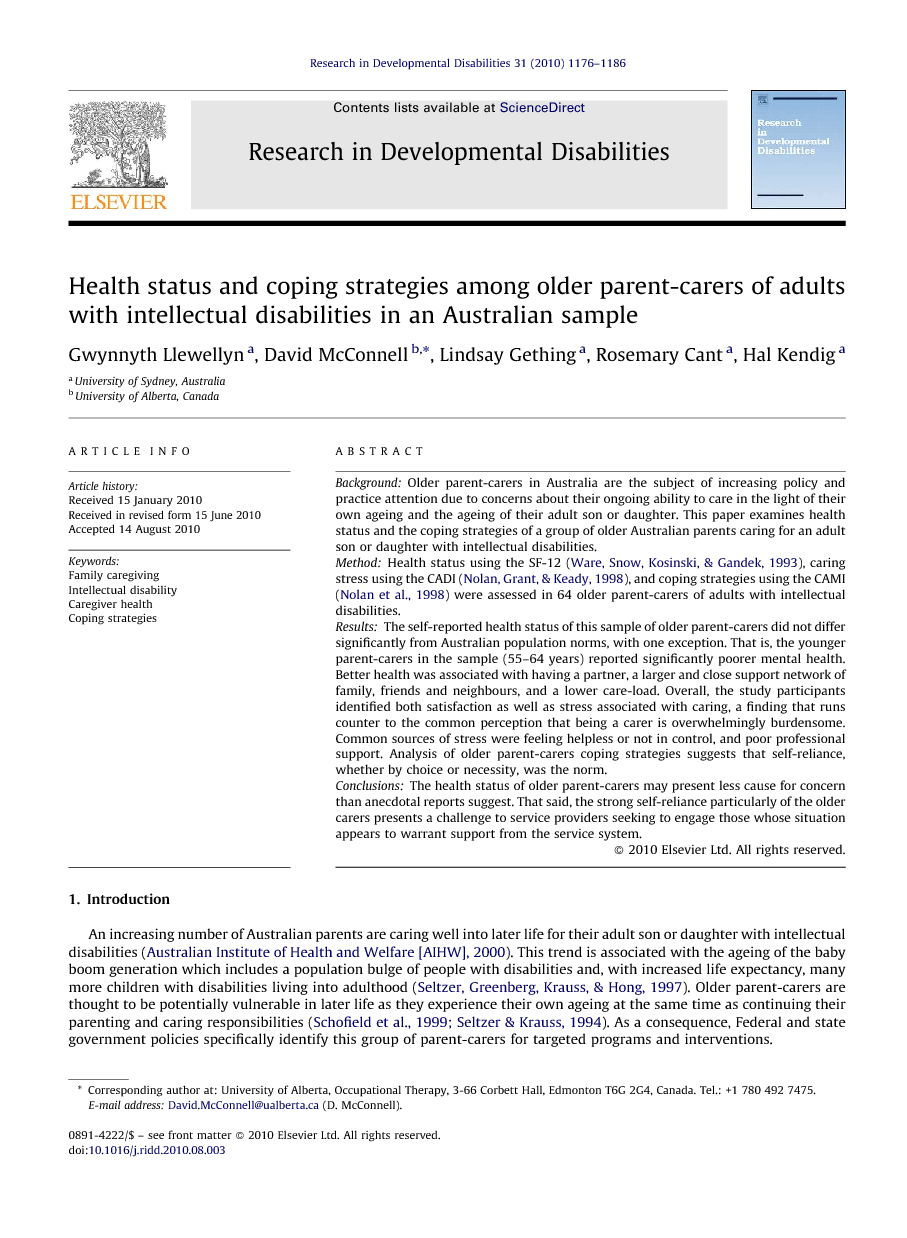Older parent-carers in Australia are the subject of increasing policy and practice attention due to concerns about their ongoing ability to care in the light of their own ageing and the ageing of their adult son or daughter. This paper examines health status and the coping strategies of a group of older Australian parents caring for an adult son or daughter with intellectual disabilities.
Method
Health status using the SF-12 (Ware, Snow, Kosinski, & Gandek, 1993), caring stress using the CADI (Nolan, Grant, & Keady, 1998), and coping strategies using the CAMI (Nolan et al., 1998) were assessed in 64 older parent-carers of adults with intellectual disabilities.
Results
The self-reported health status of this sample of older parent-carers did not differ significantly from Australian population norms, with one exception. That is, the younger parent-carers in the sample (55–64 years) reported significantly poorer mental health. Better health was associated with having a partner, a larger and close support network of family, friends and neighbours, and a lower care-load. Overall, the study participants identified both satisfaction as well as stress associated with caring, a finding that runs counter to the common perception that being a carer is overwhelmingly burdensome. Common sources of stress were feeling helpless or not in control, and poor professional support. Analysis of older parent-carers coping strategies suggests that self-reliance, whether by choice or necessity, was the norm.
Conclusions
The health status of older parent-carers may present less cause for concern than anecdotal reports suggest. That said, the strong self-reliance particularly of the older carers presents a challenge to service providers seeking to engage those whose situation appears to warrant support from the service system.
An increasing number of Australian parents are caring well into later life for their adult son or daughter with intellectual disabilities (Australian Institute of Health and Welfare [AIHW], 2000). This trend is associated with the ageing of the baby boom generation which includes a population bulge of people with disabilities and, with increased life expectancy, many more children with disabilities living into adulthood (Seltzer, Greenberg, Krauss, & Hong, 1997). Older parent-carers are thought to be potentially vulnerable in later life as they experience their own ageing at the same time as continuing their parenting and caring responsibilities (Schofield et al., 1999 and Seltzer and Krauss, 1994). As a consequence, Federal and state government policies specifically identify this group of parent-carers for targeted programs and interventions.
There are close to one half million primary carers in Australia, including persons caring for a parent, spouse, sibling, son or daughter with disabilities (AIHW, 2004). The social and economic significance of this family care effort cannot be understated. The unpaid labour of Australian primary carers has been valued at more than $19 billion per annum, dwarfing the total government contribution to welfare services (AIHW, 2004). However, there may be a personal health cost in contributing to this family care effort. Research findings suggest that primary carers experience higher age-specific rates of disability and are at-risk for debilitating stress, anxiety and depression (AIHW, 2004, Emerson et al., 2004, Hatton and Emerson, 2003, Schofield et al., 1999 and White and Hastings, 2004). In this paper we report findings on the health status of a sample of older parent-carers in Australia, the stresses they experience, and their coping strategies gathered in the context of a narrative life history study investigating care pathways over a lifetime (Llewellyn, 2003 and Llewellyn et al., 2004).


